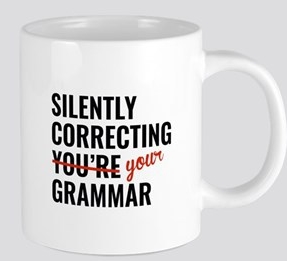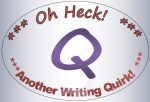Oh Heck! Another Quirky Writing Error: Too many iz-zies, ar-zies, waz-zies, and wer-zies
Iz-zies? Ar-zies? Waz-zies? Wer-zies?
What?
Funny thing, as I twerked through the Internet to see what might turn up for iz-zies, up popped izzing, a term coined by Paul Grice to explain Aristotelian philosophy.

Now I know, for sure, that great minds think alike. Of course, izzing is not Aristotle’s original word, but hey, izzing is a translation/interpretation, and that’s close enough to my iz-zies to make a connection of some kind.
Now don’t ask me how Aristotle/Grice define izzing because it’s almost beyond my comprehension. I can only figure that it has something to do with philosophic/linguistic logic. So much for my connection with Aristotle and my claim to fame by association. Nice try though, don’t you think?
Wait! I found another Izze online: The Izze Beverage Company in Boulder, Colorado, produces a carbonated juice drink called Izze. Izzes, sold in Starbucks, Whole Foods, and other stores with some snob appeal stores of distinction, appeal to the non-cola crowd. Hmm. A strawberry basil Izze sounds good right about now. (Its spelling mimics my iz-zies.)
Now, here’s the truth: I only meant to invent a unique spelling for that pesky word “is” to make this post a bit more interesting. But I needed more than iz-zies; I needed ar-zies, waz-zies, and wer-zies to represent those ubiquitous is, are, was, and were that show up so often in our writing.
Iz-zies, and her buddies, ar-zies, waz-zies, and wer-zies cause trouble for writers because they flagrantly insert themselves in writing pieces seemingly willy-nilly. They trash our writing, clog it up with extra words, and bore our readers into oblivion.
These four spindly muscled verbs strong-arm mightier verbs and pull them down to the mats by clobbering them with extra words and that dreaded -ing word ending. Iz-zies, ar-zies, waz-zies, and wer-zies also drag in that much maligned passive voice, a crime strongly chastised by grammar geeks know-it-alls, grammar snobs elite editors.
Oh Heck! I caught iz-zies, ar-zies, waz-zies, and wer-zies in my own writing. See these examples from my first draft of this post and see how I massacred them in the final draft.
 Guidelines:
Guidelines:
- Count your iz-zies, ar-zies, waz-zies, and wer-zies in your writing. (is, are, was, were)
- Count your -ing endings. (That’s a clue to weak verb use.)
- Replace iz-zies, ar-zies, waz-zies, and wer-zies with more vigorous verbs.
Action:
1. Drop the iz-zie (is) entirely and get more oomph in your writing.
Version 1. Is iz-zie really a word? What about waz-zies?
Version 2. Iz-zies? Ar-zies? Waz-zies? Wer-zies? What?
2. Change (or remove) the verb tense. Bonus: get rid of the -ing at the same time!
Version 1. I was thinking I could glam on to Aristotle’s fame with my own iz-zies…
Version 2. So much for my connection with Aristotle.
Version 3. So much for my connection with Aristotle and my claim to fame by association.
3. Rearrange sentence word order.
Version 1. The second Izze that I found on Internet was a carbonated juice drink produced by the Izze Beverage Company in Boulder, Colorado.
Version 2. The Izze Beverage Company of Boulder, Colorado produces a carbonated juice drink called Izze.
Version 3. But wait! I found another Izze online: The Izze Beverage Company in Boulder, Colorado, produces a carbonated juice drink called Izze.
4. Use appositives, a parenthetical word or phrase that gives information about the preceding noun, as a means to replace an iz-zie. (Appositives: A parenthetical phrase that explains a noun in the sentence. It is the whole phrase between the commas. Appositives can easily be removed, as in: Use Appositives as a means to replace an iz-zie.)
Version 1. Izzies are sold in Starbucks, Whole Foods, and other stores with some snob appeal stores of distinction.
Version 2. Izzies, sold in Starbucks, Whole Foods, and other stores of distinction, seem to have mass appeal.
Version 3. Izzies, sold in Starbucks, Whole Foods, and other stores with some snob appeal of distinction, appeal to the non-cola crowd.
5. Reword your sentences. Remove extra words. Remove -ing endings.
Version 1. Count your iz-zies and waz-zies and remove them by replacing them with stronger verbs.
Version 2. Reduce iz-zies and waz-zies by replacing them with stronger verbs.
Version 3. Replace iz-zies and waz-zies with stronger verbs.
Notice how each version of the above sentence got shorter and tighter?
Version 1. Of course, the truth is that I only meant to invent a funny spelling for the little word “is”…
Version 2. Now, here’s the truth: I only meant to invent a unique spelling for that pesky word “is”…
6. Use iz-zies, ar-zies, waz-zies, or wer-zies, at times, just to keep things simple. You don’t necessarily want to use a complex word when a simpler one will do the job.
Example: Of course, izzing is not Aristotle’s original word, but hey, izzing is a translation/interpretation…
Improve your writing by simply watching out for these little critters that sneak into your writing when you aren’t looking.
***
Your turn: What quirky errors do you find in writing? Which ones annoy you the most?

***
Janice Hall Heck, retired educator and now nitpicky editor of On the Horizon, a bi-monthly community newsletter for Horizons at Woods Landing, Mays Landing, NJ, is quite possibly a grammar geek.
Oh Heck! Another Quirky Writing Error, theme for the 2014 A to Z Challenge, suggests ways to improve our writing by avoiding and/or eliminating troublesome bug-a-boos that stifle our writing.
=<^;^>=
Posted in
A to Z Challenge 2014,
Common errors in writing,
Oh Heck! Another Quirky Writing Error,
Writing and tagged
-ing endings,
active voice,
appositives,
ar-zies,
editing sentences with to be verbs,
iz-zies,
passive voice,
waz-zies,
weak verbs,
wer-zies
 “? (Available from CafePress)
“? (Available from CafePress)



 Meow for now. =<^ !^>=
Meow for now. =<^ !^>=



















